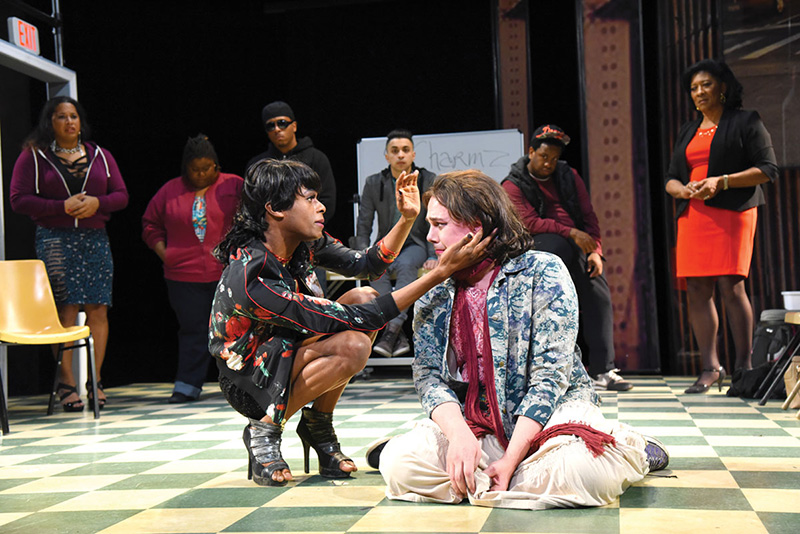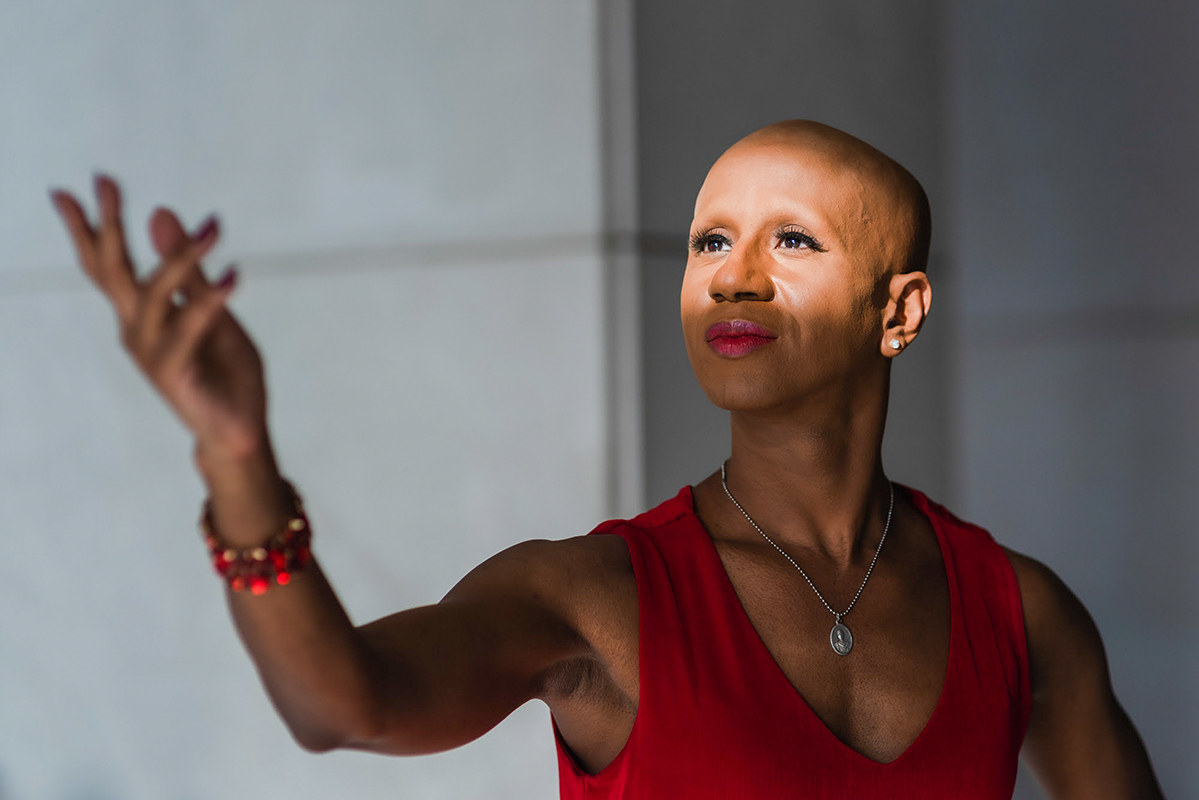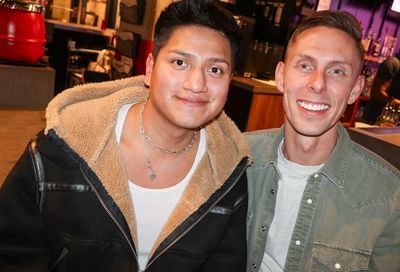Mosaic Theater’s “Charm” (review): Sharp, funny, and thoroughly engaging
Mosaic's Charm is a stirring reminder to respect the person irrespective of her, his or their gender

Representation matters. Role models matter. Undeniably powerful is the thrill of affirmation. A privileged majority spend no time in life waiting to encounter their first role model, while others might wait their entire lives before rubbing shoulders with a truly kindred soul. Such is the case for 33-year old trans woman Ariella (Nyla Rose), one of the fascinatingly multi-layered characters in Mosaic Theater’s D.C.-premiere production of Philip Dawkins’ impactful, often hilarious drama Charm (![]()
![]()
![]()
![]() ).
).
Until the day Ariella enters her first etiquette class at The Center, an inner-city organization for homeless and LGBT youth, she’s never met a self-described “tranny” as refined and put-together as her new instructor, Darleena Andrews (B’Ellana Duquesne). Inspired by real-life trans activist Mama Gloria Allen, our lady Mama Darlin — as Darleena insists her students address her — quickly sets about introducing her small class to the indispensable quality of charm. In so doing, she begins to teach the racially and gender-diverse crew a vital lesson in how to treat others and, most essentially, themselves with respect and kindness.
Given the play’s profound message about the significance of transgender visibility, it’s of immeasurable benefit to director Natsu Onoda Power’s production that she chose to cast the utterly charming genderfluid Duquesne in the role of Mama Darlin. Duquesne inhabits the part with tremendous grace and fierceness, brandishing the requisite charisma to win over her charges onstage and in the audience. The strong note of genteel Southern formality running through her performance, in her speech and her carriage, works to suggest the armor Darlin’s donned and burnished in order to conquer a tough life. That Mama Darlin’s costuming, hairstyling and ever so proper diction also occasionally suggest Tootsie‘s Dorothy Michaels perhaps is intentional. Dorothy might have been merely a fiction within a fiction, but the character endures as a stirring reminder to respect the person inside the dress irrespective of her, his or their gender.
In one of the play’s wisest moves, Mama has her own lessons to learn about showing respect, and accepting folks of all gender expressions. It requires she catch up on some new terminology and give more careful consideration to the empowering, liberating effect of voguing. (Her bit on sagging pants, while perfectly sound, feels more dated than merely old-school.) The Center’s gender-nonconforming director D. (Kimberly Gilbert) challenges Mama on her old-fashioned notions of the “appropriate” ways for young ladies and gentlemen to dress, speak and behave. It’s a deft method for the play to preach new gospel to the converted, and to those who could always benefit from stepping further outside their bubble.

In willing herself to full, unfettered life, Mama has concocted her own fiction within a fiction, and ultimately, she’ll be challenged on that — especially by Ariella, a prostitute whose entire existence might be considered inappropriate. She’s a potent fiction among several in Dawkins’ unflinching look at this disadvantaged community. Beautifully portrayed by Rose, Ariella is tough, but not impenetrable. She views herself and all the trans women she’s known before Mama in a skeptical light, yet harbors a touching need for connection that really rocks Mama’s world.
There’s a slight letdown when Mama’s whole truth finally does filter out, as blows that are meant to rock our world land only faintly. The drama’s investment in Mama’s past apparently was lost somewhere in the gleefully staged chaos of Act One. But from beginning to end, the dialogue is sharp and funny, and Ms. Duquesne never fails to engage, provided a prime platform by set designer Daniel Conway’s classroom. It’s an eye-catching criss-cross of fluorescent fixtures, photo-collage and negative space. Lighting designer Max Doolittle contributes well-timed blinks and flutters that play an important part in the show’s witty comedy.
The cast is terrific. Gilbert, fresh off her performance as Harper in Angels in America, impresses as the caring, uncompromising D. As model-thin, quick-witted Jonelle, Justin Weaks does a lot with a character about whom we learn relatively little, turning her frequent trips to the classroom whiteboard into confections of comedy that add much to the fun of spending time in Mama’s class. Jade Jones, in the role of insecure young mom Victoria, adds nuance and boundless good vibes to the inspiring production.
Charm represents the second play in Mosaic Theater Company’s ongoing series, “Clamorous Encounters: Coming of Age in America.” Much like Kirsten Greenidge’s Milk Like Sugar which preceded it, it’s unquestionably a success.
Charm runs to Jan. 29 at Atlas Performing Arts Center, Lang Theatre, 1333 H St. NE. Tickets are $20 to $60. Call 202-399-7993, ext. 2 or visit MosaicTheater.org.
Support Metro Weekly’s Journalism
These are challenging times for news organizations. And yet it’s crucial we stay active and provide vital resources and information to both our local readers and the world. So won’t you please take a moment and consider supporting Metro Weekly with a membership? For as little as $5 a month, you can help ensure Metro Weekly magazine and MetroWeekly.com remain free, viable resources as we provide the best, most diverse, culturally-resonant LGBTQ coverage in both the D.C. region and around the world. Memberships come with exclusive perks and discounts, your own personal digital delivery of each week’s magazine (and an archive), access to our Member's Lounge when it launches this fall, and exclusive members-only items like Metro Weekly Membership Mugs and Tote Bags! Check out all our membership levels here and please join us today!



























You must be logged in to post a comment.